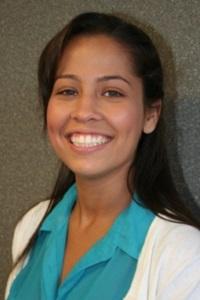
University of New Hampshire
McNair Scholar, 2015
Major: Occupational Therapy
Mentor: Dr. Shelly Mulligan and Dr. Barbara White, Department of Occupational Therapy
Research Title: Test Retest and Inter-rater Reliability of the Sensory Processing 3- Dimensions Scale
Abstract:
Sensory processing is the ability to input, perceive and integrate sensory information through the visual, auditory, taste/smell, vestibular, proprioception (sense of how the body is positioned), and tactile (sense of touch) sensory systems. Effective sensory processing helps children participate successfully in their many occupations including play, socializing with others, activities of daily living, and perform school-related activities. Therefore, it is critical that problems with sensory processing be identified early in a child’s life so that he or she can receive the necessary services to remediate the deficits. This study involves evaluating the test re-test and inter-rater reliability of the Sensory Processing 3-Dimensions Scale (SP-3D), which is a new assessment tool designed to measure sensory processing in children from 3 years to 12 years, 11 months. The SP-3D is developed as a comprehensive, performance-based measure, and therefore will be of benefit to the field of occupational therapy, and other professions who work with children with sensory processing disorders for both clinical and research purposes. It is important that all standardized evaluation tools be assessed for both validity and reliability to ensure the measures are psychometrically sound. Evaluation tools should provide evidence that they measure whatever the test intends to measure, and that the constructs are measured in a consistent or reliable way. Only one study has been recently completed testing the criterion-related validity, which compared scores from the SP-3D with scores for the Sensory Processing Measure. This study will therefore be combined with future studies using the SP-3D examining aspects of the test’s reliability.